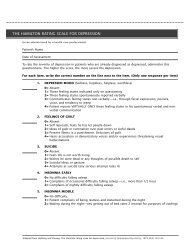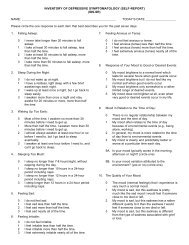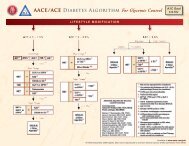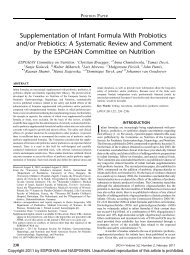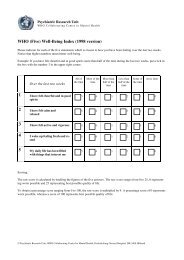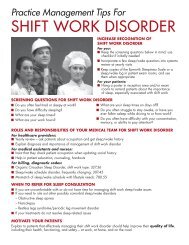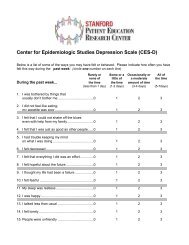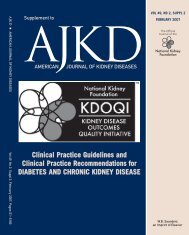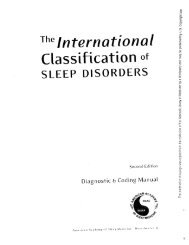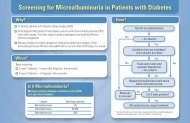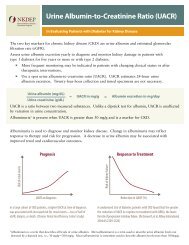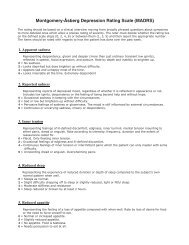Shift-work disorder - myCME.com
Shift-work disorder - myCME.com
Shift-work disorder - myCME.com
You also want an ePaper? Increase the reach of your titles
YUMPU automatically turns print PDFs into web optimized ePapers that Google loves.
Dose-response effects on neurobehavioral functions<br />
and sleep physiology from chronic sleep<br />
restriction and total sleep deprivation. Sleep.<br />
2003;26:117-126.<br />
11. Youngstedt SD. Effect of exercise on sleep. Clin<br />
Sports Med. 2005;24:355-365.<br />
12. Leppämäki S, Partonen T, Lönnqvist J. Brightlight<br />
exposure <strong>com</strong>bined with physical exercise<br />
elevates mood. J Affect Disord. 2002;72:139-144.<br />
13. Youngstedt SD, Kripke DF, Elliott JA, et al. Exercise<br />
phase-response curves in young and older<br />
adults. Soc Res Biol Rhythms. 2002;8:110.<br />
14. Barger LK, Wright KP, Hughes RJ, et al. Daily exercise<br />
facilitates phase delays of circadian melatonin<br />
rhythm in very dim light. Am J Physiol Regul<br />
Integr Compl Physiol. 2004;286:R1077-R1084.<br />
15. LeDuc PA, Caldwell JA, Ruyak PS. The effect of<br />
exercise as a countermeasure for fatigue in sleepdeprived<br />
aviators. Mil Psychol. 2000;12:249-266.<br />
16. Arora V, Dunphy C, Chang VY, et al. The effect<br />
of on-duty napping on intern sleep time and fatigue.<br />
Ann Intern Med. 2006;144:792-798.<br />
17. Bonnefond A, Muzet A, Winter-Dill AS, et al.<br />
Innovative <strong>work</strong>ing schedule: introducing one<br />
short nap during the night shift. Ergonomics.<br />
2001;44:937-945.<br />
18. Kubo T, Takeyama H, Matsumoto S, et al. Impact<br />
of nap length, nap timing and sleep quality<br />
on sustaining early morning performance. Ind<br />
Health. 2007;45:552-563.<br />
19. Purnell MT, Feyer AM, Herbison GP. The impact<br />
of a nap opportunity during the night shift on the<br />
performance and alertness of 12-h shift <strong>work</strong>ers.<br />
J Sleep Res. 2002;11:219-227.<br />
20. Ribeiro-Silva F, Rotenberg L, Soares RE, et al.<br />
Sleep on the job partially <strong>com</strong>pensates for sleep<br />
loss in night-shift nurses. Chronobiol Int. 2006;<br />
23:1389-1399.<br />
21. Sallinen M, Harma M, Akerstedt T, et al. Promoting<br />
alertness with a short nap during a night shift.<br />
J Sleep Res. 1998;7:240-247.<br />
22. Schweitzer PK, Randazzo AC, Stone K, et al. Laboratory<br />
and field studies of naps and caffeine as<br />
practical countermeasures for sleep–wake problems<br />
associated with night <strong>work</strong>. Sleep. 2006;<br />
29:39-50.<br />
23. Berson DM, Dunn FA, Takao M. Phototransduction<br />
by retinal ganglion cells that set the circadian<br />
clock. Science. 2002;295:1070-1073.<br />
24. Czeisler CA, Kronauer RE, Allan JS, et al. Bright<br />
light induction of strong (type 0) resetting of the<br />
human circadian pacemaker. Science. 1989;244:<br />
1328-1333.<br />
25. Oren DA, Terman M. Tweaking the human circadian<br />
clock with light. Science. 1998;279:333-334.<br />
26. Arendt J. Melatonin and human rhythms. Chronobiol<br />
Int. 2006;23:21-37.<br />
27. Sack R, Lewy A, Hughes RJ, et al. Melatonin as a<br />
chronobiotic drug. Drug News Perspect. 1996;9:<br />
325-332.<br />
28. Gooley JJ. Treatment of circadian rhythm sleep<br />
<strong>disorder</strong>s with light. Ann Acad Med Singapore.<br />
2008;37:669-676.<br />
29. Czeisler CA, Dijk DJ. Use of bright light to treat<br />
maladaptation to night shift <strong>work</strong> and circadian<br />
rhythm sleep <strong>disorder</strong>s. J Sleep Res. 1995;4(suppl<br />
2):70-73.<br />
30. Gronfier C, Wright KP Jr, Kronauer RE, et al. Entrainment<br />
of the human circadian pacemaker to<br />
longer-than-24-h days. Proc Natl Acad Sci U S A.<br />
2007;104:9081-9086.<br />
31. Horowitz TS, Cade BE, Wolfe JM, et al. Efficacy<br />
of bright light and sleep/darkness scheduling in<br />
alleviating circadian maladaption to night <strong>work</strong>.<br />
Am J Physiol Endocrinol Metab. 2001;281:E384-<br />
E391.<br />
32. Crowley SJ, Lee C, Tseng CY, et al. Complete or<br />
partial circadian re-entrainment improves performance,<br />
alertness, and mood during nightshift<br />
<strong>work</strong>. Sleep. 2004;27:1077-1087.<br />
33. Babkoff H, French J, Whitmore J, et al. Singledose<br />
bright light and/or caffeine effect on nocturnal<br />
performance. Aviat Space Environ Med.<br />
2002;73:341-350.<br />
34. Eastman CI, Stewart KT, Mahoney MP, et al.<br />
Dark goggles and bright light improve circadian<br />
rhythm adaptation to night-shift <strong>work</strong>. Sleep.<br />
1994;17:535-543.<br />
35. Smith MR, Fogg LF, Eastman CI. Practical intervention<br />
to promote circadian adaptation to permanent<br />
night shift <strong>work</strong>: study 4. J Biol Rhythms.<br />
2009;24:161-172.<br />
36. Crowley SJ, Lee C, Tseng CY, et al. Combinations<br />
of bright light, scheduled dark, sunglasses, and<br />
melatonin to facilitate circadian entrainment to<br />
night shift <strong>work</strong>. J Biol Rhythms. 2003;18:513-<br />
523.<br />
37. Santhi N, Aeschbach D, Horowitz TS, et al. The<br />
impact of sleep timing and bright light exposure<br />
on attentional impairment during night <strong>work</strong>. J<br />
Biol Rhythms. 2008;23:341-352.<br />
38. Lyznicki JM, Doege TC, Davis RM, et al. Sleepiness,<br />
driving, and motor vehicle crashes. Council<br />
on Scientific Affairs, American Medical Association.<br />
JAMA. 1998;279:1908-1913.<br />
39. Kingshott RN, Cowan JO, Jones DR, et al. The role<br />
of sleep-<strong>disorder</strong>ed breathing, daytime sleepiness,<br />
and impaired performance in motor vehicle<br />
crashes—a case control study. Sleep Breath.<br />
2004;8:61-72.<br />
40. Akerstedt T, Peters B, Anund A, et al. Impaired<br />
alertness and performance driving home from<br />
the night shift: a driving simulator study. J Sleep<br />
Res. 2005;14:17-20.<br />
41. Richardson GS, Miner JD, Czeisler CA. Impaired<br />
driving performance in shift<strong>work</strong>ers: the role of<br />
the circadian system in a multifactorial model.<br />
Alcohol Drugs Driving. 1989-1990;5-6:265-273.<br />
42. Rogers A, Holmes S, Spencer M. The effect of<br />
shift<strong>work</strong> on driving to and from <strong>work</strong>. J Hum<br />
Ergol (Tokyo). 2001;30:131-136.<br />
43. Scott LD, Hwang WT, Rogers AE, et al. The relationship<br />
between nurse <strong>work</strong> schedules, sleep<br />
duration, and drowsy driving. Sleep. 2007;30:<br />
1801-1807.<br />
44. Paz A, Berry EM. Effect of meal <strong>com</strong>position on<br />
alertness and performance of hospital night-shift<br />
<strong>work</strong>ers. Do mood and performance have different<br />
determinants? Ann Nutr Metab. 1997;41:<br />
291-298.<br />
45. Czeisler CA, Walsh JK, Roth T, et al. Modafinil for<br />
excessive sleepiness associated with shift-<strong>work</strong><br />
sleep <strong>disorder</strong>. N Engl J Med. 2005;353:476-486.<br />
46. Erman MK, Rosenberg R, for the US Modafinil<br />
<strong>Shift</strong> Work Sleep Disorder Study Group. Modafinil<br />
for excessive sleepiness associated with chronic<br />
shift <strong>work</strong> <strong>disorder</strong>: effects on patient functioning<br />
and health-related quality of life. Prim Care<br />
Companion J Clin Psychiatry. 2007;9:188-194.<br />
47. Drake C, Walsh J, Roth T. Armodafinil improves<br />
sleep latency in patients with shift <strong>work</strong> <strong>disorder</strong>.<br />
Sleep. 2006;29(suppl):A64.<br />
48. Roth T, Czeisler CA, Walsh JK, et al. Randomized,<br />
double-blind, placebo-controlled study of<br />
armodafinil for the treatment of excessive sleepiness<br />
associated with chronic shift <strong>work</strong> <strong>disorder</strong><br />
[abstract 161]. Neuropsychopharmacology.<br />
2005;30:S140.<br />
49. Darwish M, Kirby M, Hellriegel ET, et al. Armodafinil<br />
and modafinil have substantially different<br />
pharmacokinetic profiles despite having<br />
the same terminal half-lives: analysis of data from<br />
three randomized, single-dose, pharmacokinetic<br />
studies. Clin Drug Investig. 2009;29:613-623.<br />
50. Darwish M, Kirby M, Hellriegel ET. Comparison<br />
of steady-state plasma concentrations of armodafinil<br />
and modafinil late in the day following<br />
morning administration: post hoc analysis of two<br />
randomized, double-blind, placebo-controlled,<br />
multiple-dose studies in healthy male subjects.<br />
Clin Drug Investig. 2009;29:601-612.<br />
51. Hart CL, Ward AS, Haney M, et al. Methamphetamine<br />
attenuates disruptions in performance<br />
and mood during simulated night-shift <strong>work</strong>.<br />
Psychopharmacology. 2003;169:42-51.<br />
52. Hart CL, Haney M, Nasser J, et al. Combined<br />
effects of methamphetamine and zolpidem<br />
on performance and mood during simulated<br />
night shift <strong>work</strong>. Pharmacol Biochem Behav.<br />
2005;81:559-568.<br />
53. Darke S, Kaye S, McKetin R, et al. Major physical<br />
and psychological harms of methamphetamine<br />
use. Drug Alcohol Rev. 2008;27:253-262.<br />
54. Jay SM, Petrilli RM, Ferguson SA, et al. The suitability<br />
of a caffeinated energy drink for nightshift<br />
<strong>work</strong>ers. Physiol Behav. 2006;87:925-931.<br />
55. Muehlbach MJ, Walsh JK. The effects of caffeine<br />
on simulated night-shift <strong>work</strong> and subsequent<br />
daytime sleep. Sleep. 1995;18:22-29.<br />
56. Walsh JK, Muehlbach MJ, Humm TM, et al. Effect<br />
of caffeine on physiological sleep tendency<br />
and ability to sustain wakefulness at night. Psychopharmacology.<br />
1990;101:271-273.<br />
57. Wyatt JK, Cajochen C, Ritz-De Cesso A, et al.<br />
Low-dose repeated caffeine administration for<br />
circadian-dependent performance degradation<br />
during extended wakefulness. Sleep. 2004;27:<br />
374-381.<br />
58. Haller C, Kearney T, Bent S, et al. Dietary supplement<br />
adverse events: report of a one-year poison<br />
center surveillance project. J Med Toxicol.<br />
2008;4:84-92.<br />
59. Judelson DA, Armstrong LE, Sökmen B, et al. Effect<br />
of chronic caffeine intake on choice reaction<br />
time, mood, and visual vigilance. Physiol Behav.<br />
2005;85:629-634.<br />
60. Hughes RJ, Badia P. Sleep-promoting and hypothermic<br />
effects of daytime melatonin administration<br />
in humans. Sleep. 1997;20:124-131.<br />
61. Sharkey KM, Eastman CI. Melatonin phase shifts<br />
human circadian rhythms in a placebo-controlled<br />
simulated night-<strong>work</strong> study. Am J Physiol<br />
Regul Integr Comp Physiol. 2002;282:R454-R463.<br />
62. Sharkey KM, Fogg LF, Eastman CI. Effects of<br />
melatonin administration on daytime sleep after<br />
simulated night shift <strong>work</strong>. J Sleep Res. 2001;10:<br />
181-192.<br />
63. Wyatt JK, Dijk DJ, Ritz-De Cecco A, et al. Sleepfacilitating<br />
effect of exogenous melatonin in<br />
healthy young men and women is circadianphase<br />
dependent. Sleep. 2006;29:609-618.<br />
64. Yoon IY, Song BG. Role of morning melatonin<br />
administration and attenuation of sunlight exposure<br />
in improving adaptation of night-shift<br />
<strong>work</strong>ers. Chronobiol Int. 2002;19:903-913.<br />
65. Wright SW, Lawrence LM, Wrenn KD, et al.<br />
Randomized clinical trial of melatonin after<br />
night-shift <strong>work</strong>: efficacy and neuropsychologic<br />
effects. Ann Emerg Med. 1998;32:334-340.<br />
66. Revell VL, Burgess HJ, Gazda CJ, et al. Advancing<br />
human circadian rhythms with afternoon<br />
melatonin and morning intermittent bright light.<br />
J Clin Endocrinol Metab. 2006;91:54-59.<br />
67. Bonnet MH, Dexter JR, Gillin JC, et al. The use of<br />
triazolam in phase-advanced sleep. Neuropsychopharmacology.<br />
1988;1:225-234.<br />
68. Casagrande M, Ferrara M, Curcio G, et al. Assessing<br />
nighttime vigilance through a three-letter<br />
cancellation task (3-LCT): effects of daytime<br />
sleep with temazepam or placebo. Physiol Behav.<br />
1999;68:251-256.<br />
69. Hart CL, Ward AS, Haney M, et al. Zolpidemrelated<br />
effects on performance and mood during<br />
simulated night-shift <strong>work</strong>. Exp Clin Psychopharmacol.<br />
2003;11:259-268.<br />
70. Moon CA, Hindmarch I, Holland RL. The effect<br />
of zopiclone 7.5 mg on the sleep, mood and performance<br />
of shift <strong>work</strong>ers. Int Clin Psychopharmacol.<br />
1990;5(suppl 2):79-83.<br />
Supplement to The Journal of Family Practice • Vol 59, No 1 / January 2010 S31



